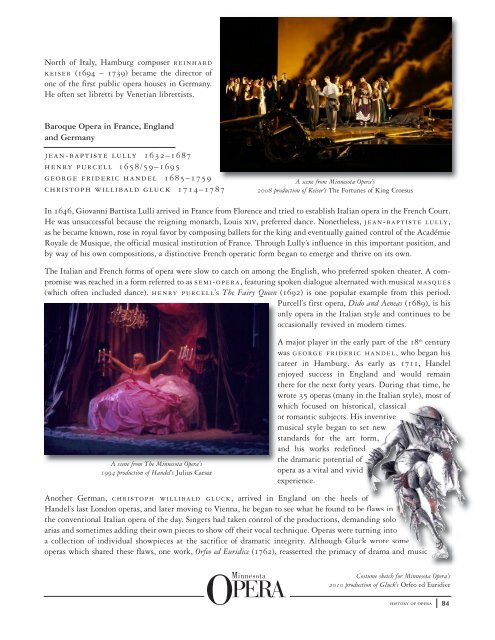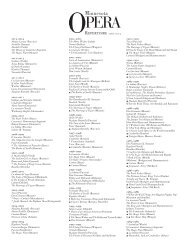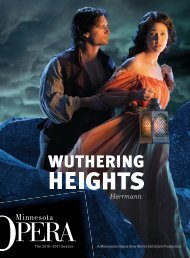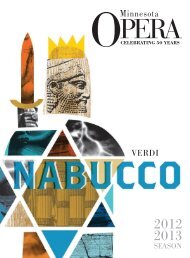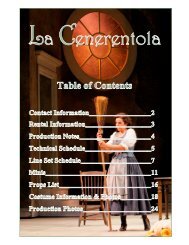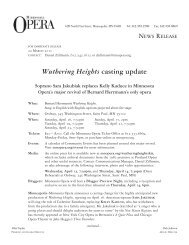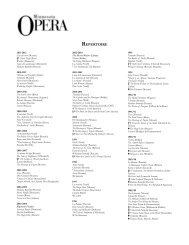Create successful ePaper yourself
Turn your PDF publications into a flip-book with our unique Google optimized e-Paper software.
North of Italy, Hamburg composer reinhard<br />
keiser (1694 – 1739) became the director of<br />
one of the first public opera houses in Germany.<br />
He often set libretti by Venetian librettists.<br />
Baroque <strong>Opera</strong> in France, England<br />
and Germany<br />
jean-baptiste lully 1632–1687<br />
henry purcell 1658/59–1695<br />
george frideric handel 1685–1759<br />
christoph willibald gluck 1714–1787<br />
A scene from <strong>Minnesota</strong> <strong>Opera</strong>’s<br />
2008 production of Keiser’s The Fortunes of King Croesus<br />
In 1646, Giovanni Battista Lulli arrived in France from Florence and tried to establish Italian opera in the French Court.<br />
He was unsuccessful because the reigning monarch, Louis xiv, preferred dance. Nonetheless, jean-baptiste lully,<br />
as he became known, rose in royal favor by composing ballets for the king and eventually gained control of the Académie<br />
Royale de Musique, the official musical institution of France. Through Lully’s influence in this important position, and<br />
by way of his own compositions, a distinctive French operatic form began to emerge and thrive on its own.<br />
The Italian and French forms of opera were slow to catch on among the English, who preferred spoken theater. A compromise<br />
was reached in a form referred to as semi-opera, featuring spoken dialogue alternated with musical masques<br />
(which often included dance). henry purcell’s The Fairy Queen (1692) is one popular example from this period.<br />
Purcell’s first opera, Dido and Aeneas (1689), is his<br />
only opera in the Italian style and continues to be<br />
occasionally revived in modern times.<br />
A scene from The <strong>Minnesota</strong> <strong>Opera</strong>’s<br />
1994 production of Handel’s Julius Caesar<br />
A major player in the early part of the 18 th century<br />
was george frideric handel, who began his<br />
career in Hamburg. As early as 1711, Handel<br />
enjoyed success in England and would remain<br />
there for the next forty years. During that time, he<br />
wrote 35 operas (many in the Italian style), most of<br />
which focused on historical, classical<br />
or romantic subjects. His inventive<br />
musical style began to set new<br />
standards for the art form,<br />
and his works redefined<br />
the dramatic potential of<br />
opera as a vital and vivid<br />
experience.<br />
Another German, christoph willibald gluck, arrived in England on the heels of<br />
Handel’s last London operas, and later moving to Vienna, he began to see what he found to be flaws in<br />
the conventional Italian opera of the day. Singers had taken control of the productions, demanding solo<br />
arias and sometimes adding their own pieces to show off their vocal technique. <strong>Opera</strong>s were turning into<br />
a collection of individual showpieces at the sacrifice of dramatic integrity. Although Gluck wrote some<br />
operas which shared these flaws, one work, Orfeo ed Euridice (1762), reasserted the primacy of drama and music<br />
Costume sketch for <strong>Minnesota</strong> <strong>Opera</strong>’s<br />
2010 production of Gluck’s Orfeo ed Euridice<br />
history of opera<br />
84


